Everybody wants to write about wine, but no one wants to grow grapes
I'm really doubting my career choice
Wine was the reason I moved to Italy in the first place, truth be told. I knew there was so much to learn about different grape varieties, farming, food, and drinking culture. I remember my first day of the Introductory Sommelier Course and Examination, 8 years ago. I listened intently to the proctor tell us about the terroir of the Mosel and the unique attributes of its Riesling. I thought to myself, why am I listening to someone talk about it, when I could just go experience it for myself. So, I did. After that, I made it my mission to experience things at the source. First Spain, then Napa, then Italy, then Germany, then Portugal. I took the au pair job in Rome so I could experience Italian food and culture from a practical/everyday family point of view. I spent my mornings and early evenings with my kids while my afternoons, later evenings and weekends were spent roaming the city in search of wine bars, wine shops and wine experiences I knew didn’t exist in the states. I drank with people that lived there (I hesitate using the word “local” because in Rome that term is a little problematic) and I learned by doing, not by reading someone else's interpretation of the subject. It took a lot of trial and error, and I am blessed that I had help along the way; that help came from Italians themselves, people who drank wine, enjoyed a spritz without asking a million questions and analyzing all the details.
I read wine, beer and spirits publications and I feel as though they are asking the wrong people’s opinion. It seems like there is surplus of people who want to sell wine, taste wine, write about wine, but there are so few people who want to make wine, there are even fewer people who want to grow grapes. I would love to do that, but I doubt I will ever be able to own land (let alone property) in California. My mom is supportive of me planting grapevines on the hill in our backyard, which may be the big project this Spring. I just don’t have the energy to keep pushing to be recognized or valued for my wine experience and education. I feels like ever since I returned home from Italy I am brutally reminded that I should have proved my experience through pictures of wines drank and video reels documenting the wineries I visited. But I don’t have those, I have stories in writing on this very substack. I wrote an 80-page thesis on the subject of sustainable wine production in Italy, but I guess it’s a little more difficult for that to go viral.
I had the chance to live and learn about Italian wine at the source. I traveled throughout the country visiting wine bars in each city, drinking whatever the waiter suggested. I always checked out the natural wine shops-mainly to gain inspiration for my own enoteca / alimentari (someday) and I would always buy a bottle to bring back to Rome. Sharing wine with friends who know nothing about wine, is the best, because the wine is simply enjoyed and unanalyzed. When I first moved to Italy, I wanted to work a wine harvest, but I also wanted to visit as many producers as possible. So for a year I visited festivals, and wine fairs and collected business cards from people that were nice enough to chat with me (not everyone was). I sent over 100 emails asking if I could somehow, someway, visit their winery and get to know them and their land, in person. Out of the 100 places, eight replied. So I went to all eight places. Some visits were simple day trips, somewhere full-on working weeks. This winery in Tuscany let me shadow the wine educator and learn how to conduct the tastings so I could learn the wines in depth, on the last day, I led my own tour and tasting for this group of tourists from Belgium, we were all around the same age we had a great time.
I shared wine with winemakers over lunch in their homes, they cooked me meals and told me their story which would never fit on a wine tech sheet. I am much more satisfied in learning about wine the way that I did. Frankly, narratives are the types of wine stories I would rather read, that’s why I enjoy reading
’s books (multiple), ’s book, You Had Me at Pet-Nat and for those interested in all things Paris, I am reading ’s book The New Paris right now and I’m loving it. They all write about experiencing things at the source, about physicality and struggle, they provide the reader with backstory, context and real-life experiences.I’ve been writing this piece all day, because I am really doubting if I chose the right industry to work in. It seems as though my pitches for wine and beverage publications very seldom get picked up, I doubt they are even read in the first place. But maybe I am just bad at picking topics their audience wants to read. Maybe these things take time. Quindi, I’ll just write about those topics here, in my own safe space.
At this point, I don’t know if I can consciously support writing about and selling a luxury good, which wine is when you analyze it. Let’s say I buy a case of wine a month for 12 months, at 25 dollars a bottle (which I consider the baseline for a good quality bottle) at the end of the year that amounts to $3,600 dollars in wine. That is more than my car payment + insurance for an entire year (when I had a car that is, I sold it when I moved to Italy). Speaking of which, I moved to Italy to learn about wine, but I left with a conscious that makes it hard to enjoy the stuff, especially European wine. I am at the point where I know too much about the carbon footprint of the wine industry. The idea that shipping bottles of vino half away across the world so people can drink five glasses of it, doesn’t align with my own sustainable life ethos. I also see how disconnected wine industry professionals are from the complexities of wine and agribusiness, and how the general public is unware that the environment is absorbing the cost of our wine consuming habits.
I understand the appeal, people want to learn about terroir, and drink cool bottles, and taste wine made from different grape varieties other than Chardonnay and Cabernet Sauvignon, which the California wine industry has no shortage of. Unfortunately, California dug itself into a very lucrative hole in the 90s when winery owners and vineyard managers dedicated entire properties to these two grape varieties because that is what was popular at the time. Alice Feiring’s book, The Battle for Wine and Love: or How I Saved the World from Parkerization, goes into detail about this phenomenon, as does Authentic Wine: Toward Natural and Sustainable Winemaking by Jamie Goode and Sam Harrop. I would love to see more Italian, and Portuguese varieties grown in California; we certainty have the climate for them. (You all know I say “we” because I was born and raised there, right?) But why would people buy well-made California Sangiovese or Malvasia or Alvarinho for $30-40 when they can buy pretty good wine made with the same grapes “from the source” for $20 or less, which is usually the case. I have run into the same argument with people about how ‘if you want to true expression of the grape, try it ‘from the source’ but I don’t know if the carbon emissions are worth it anymore. I also think there is a difference between trying things at the source vs. from the source. I am pro at the source because then you can gain some context, and experience the literal terroir, by seeing, breathing, feeling (however you need to interpret it) for yourself, not just reading about it on a wine tech sheet.
In my experience, wine and food taste better when it doesn’t have to travel far; one of the core principles behind the farm-to-table movement (even though that term is not regulated). It seems like the natural wine community doesn’t always think about the short food supply chain aspect of the industry. It’s the same problem I have with processed vegan meat products. I consider myself vegetarian, but I would rather eat a grass-fed beef burger with meat supplied by a local farm, than an ultra-processed, resource intensive “fake burger”. It seems counterproductive. Not to mention natural wine can be sensitive to light exposure and heat fluctuations and long-distance travel increases those variables. So demanding wine products from halfway across the world because they are “natural” seems misguided. Craft beer has the same problem, which not a lot of people realize. My friend Bryan writes about this topic in his book, Italy: Beer Country: The Story of Italian Craft Beer. It feels like food (sustainable food), is a more important issue in the world right now, and I would love to see wine and beer make its way into the sustainable food system conversation on a policy level. Let’s start with packaging. Which to be fair, it is, in the European Union (google PPWR).
Now that I am back in California for the foreseeable future, I am on a mission to find California winemakers that farm organically and make natural wine here, in my own short-food supply chain radius. Ideally, I would love to drink anything other than Chardonnay and Cabernet Sauvignon, but beggars can’t be choosers. I’ll keep you posted on my journey and who I meet along the way. I want to do a comparison of winery visits in California vs. visits I had in Italy so I am planning a sustainable wine road trip, as it were. I imagine there will be less meals made by the winemaker’s mom, and coffee breaks in the vineyard, and more of sleeping on friends’ couches and eating In-N-Out. But hey it’s a part of the story. And for the record, at In-N-Out I order a grilled cheese: animal style.
Shoutout to the authors listed above for writing books that I continue to pick up and read for inspiration. If anyone knows them personally, feel free to tell them grazie mille for me.
Special shoutout to
whose piece titled Wine is Boring (among many others) inspired the title for this piece. She probably has a few things to say about this phenomemon as well.Happy reading awesome women in wine content!

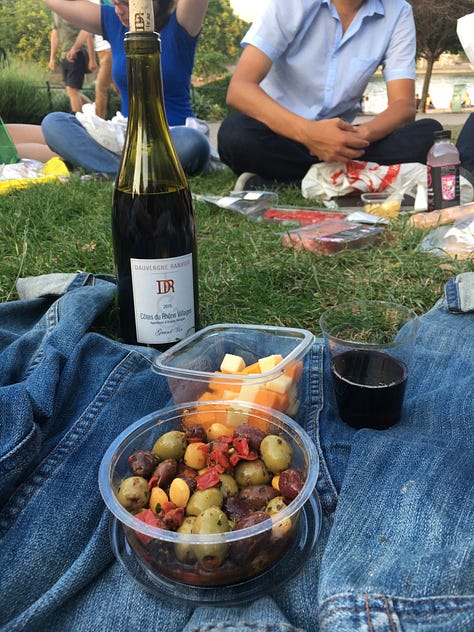
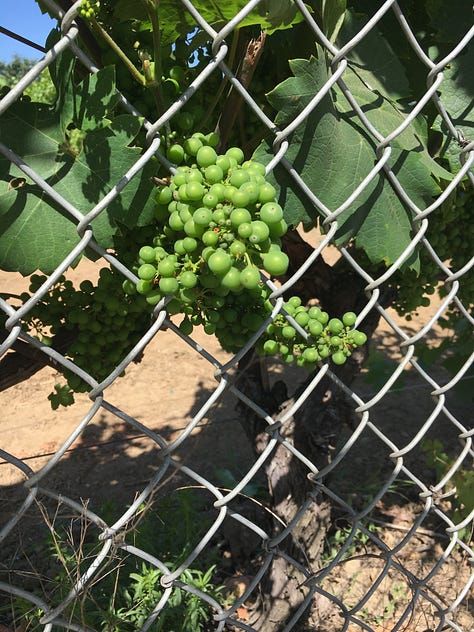
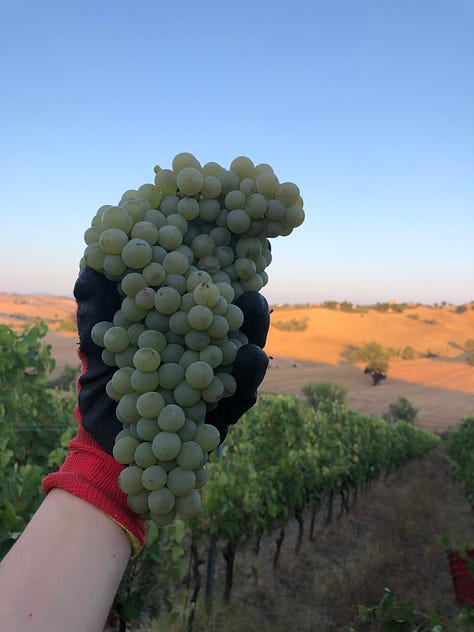
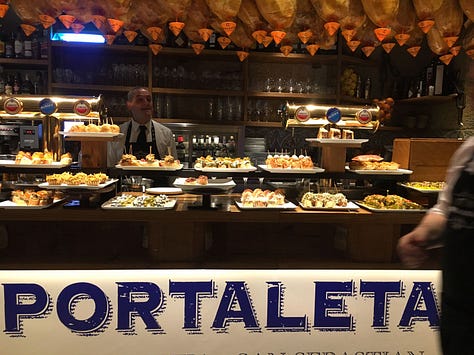
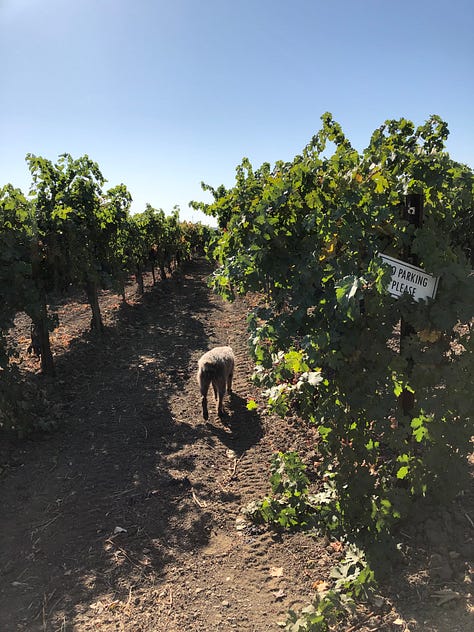
My favorite wine shop in Modena that helped me discover my love of sparkling Lambrusco rosé. My first time in Paris, drinking wine from the supermarket back then (7 years ago), well worth 5 euros. Grapes growing in my neighbor’s yard in Napa. Picking grapes in Marche. Learning about Spanish wine at a pintxo bar in San Sebastián. My first visit to Frog’s Leap Winery, not pictured the Stags Leap Wine Cellars Cabernet Sauvignon from 1976 we drank during lunch.




Also...don't get down about making a name. This industry is well known for gatekeeping and ita mostly by old white dudes in NYC or London who have never touched soil. Fuck them. That's why substack is the future.
I think we all go through this weird period wondering if it's worth it? I personally don't drink at home anymore and realised that I enjoy vingerons amd vineyards rather than bottles.
As far as California, there are some great producers growing APPROPRIATE grapes for our climate. Those Napa Cabs aren't going survive climate change.
This industry needs a paradigm shift and I am glad there are young people like you doing the work.